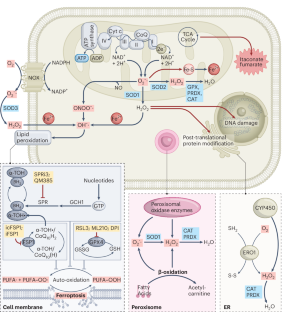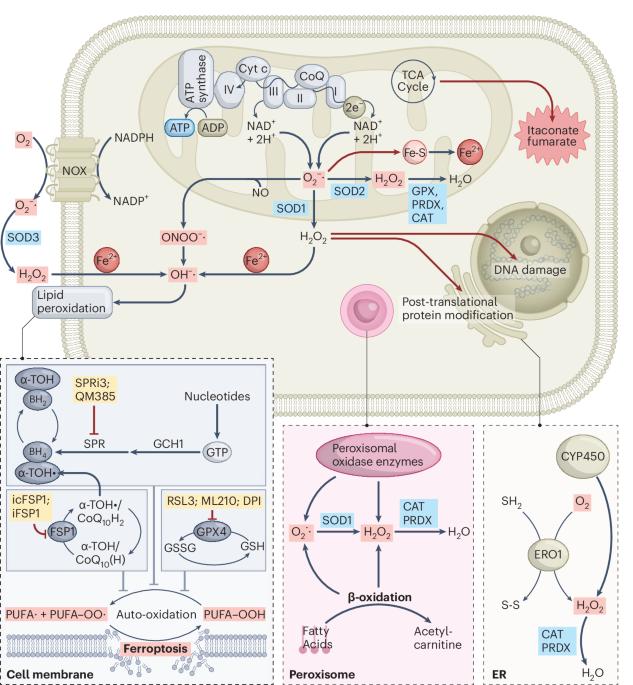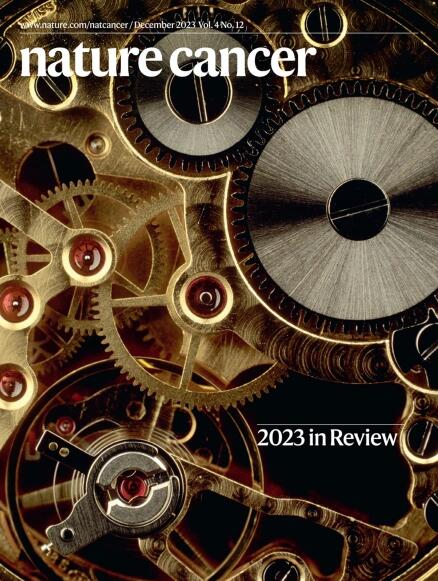The pleiotropic functions of reactive oxygen species in cancer
IF 28.5
1区 医学
Q1 ONCOLOGY
引用次数: 0
Abstract
Cellular redox homeostasis is an essential, dynamic process that ensures the balance between reducing and oxidizing reactions within cells and thus has implications across all areas of biology. Changes in levels of reactive oxygen species can disrupt redox homeostasis, leading to oxidative or reductive stress that contributes to the pathogenesis of many malignancies, including cancer. From transformation and tumor initiation to metastatic dissemination, increasing reactive oxygen species in cancer cells can paradoxically promote or suppress the tumorigenic process, depending on the extent of redox stress, its spatiotemporal characteristics and the tumor microenvironment. Here we review how redox regulation influences tumorigenesis, highlighting therapeutic opportunities enabled by redox-related alterations in cancer cells. Papagiannakopoulos and colleagues discuss the roles of reactive oxygen species in cancer and the ways in which redox mechanisms may be exploited for cancer therapy.


活性氧在癌症中的多种功能
细胞氧化还原平衡是一个重要的动态过程,它能确保细胞内还原反应和氧化反应之间的平衡,因此对生物学的所有领域都有影响。活性氧水平的变化会破坏氧化还原平衡,导致氧化或还原应激,从而引发包括癌症在内的多种恶性肿瘤。从癌细胞转化、肿瘤发生到转移扩散,癌细胞中活性氧的增加可促进或抑制肿瘤发生过程,这取决于氧化还原应激的程度、时空特征和肿瘤微环境。在此,我们回顾了氧化还原调控如何影响肿瘤发生,并强调了癌细胞中氧化还原相关改变带来的治疗机会。
本文章由计算机程序翻译,如有差异,请以英文原文为准。
求助全文
约1分钟内获得全文
求助全文
来源期刊

Nature cancer
Medicine-Oncology
CiteScore
31.10
自引率
1.80%
发文量
129
期刊介绍:
Cancer is a devastating disease responsible for millions of deaths worldwide. However, many of these deaths could be prevented with improved prevention and treatment strategies. To achieve this, it is crucial to focus on accurate diagnosis, effective treatment methods, and understanding the socioeconomic factors that influence cancer rates.
Nature Cancer aims to serve as a unique platform for sharing the latest advancements in cancer research across various scientific fields, encompassing life sciences, physical sciences, applied sciences, and social sciences. The journal is particularly interested in fundamental research that enhances our understanding of tumor development and progression, as well as research that translates this knowledge into clinical applications through innovative diagnostic and therapeutic approaches. Additionally, Nature Cancer welcomes clinical studies that inform cancer diagnosis, treatment, and prevention, along with contributions exploring the societal impact of cancer on a global scale.
In addition to publishing original research, Nature Cancer will feature Comments, Reviews, News & Views, Features, and Correspondence that hold significant value for the diverse field of cancer research.
 求助内容:
求助内容: 应助结果提醒方式:
应助结果提醒方式:


